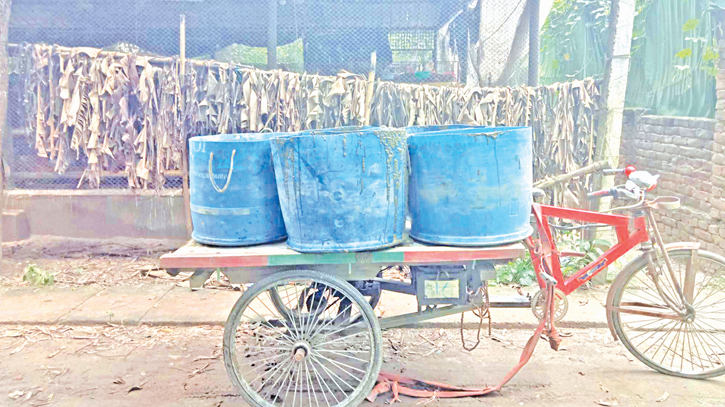
The photo shows a van transporting chicken waste in drums to a pond, employing an unconventional practice of using it as a nutrient source for raising fish. PHOTO : TDM
In the Narsingdi district, a significant number of fish growers are employing an unconventional practice of raising fish using chicken droppings in their ponds as a nutrient source. This method has raised concerns about potential threats to public health posed by consuming such fish.
A substantial 17,258.8 metric tons of fish are under commercial cultivation, spread across 3,739 ponds, spanning an expanse of 1,109.4 hectares of land. Interestingly,
The question of how chicken droppings, typically considered waste, transform into sustenance for fish has intrigued many. This region witnesses the direct incorporation of chicken droppings from farms into ponds without proper preprocessing. Unfortunately, this haphazard approach is causing severe environmental degradation, characterized by pond water pollution and a noxious odor.
Alongside this, near the pond banks, one can observe fish farmers bagging and stockpiling chicken litter for use in aquaculture. This activity is contributing to air pollution and fostering the spread of diseases among both the ponds and local populace. Adding complexity to the situation, the majority of commercial fish farmers wield considerable social influence, which stifles opposition from the general public.
Upon investigation, it is evident that a significant number of ponds in Gramganj, including areas like Puthia of Narsingdi, Char, Ghorashal, Raban, Hasnabad, Char Ahaliya, Hatuvanga, and Palastuli of Itakhola Munsef, are heavily reliant on chicken excrement. As a result of this practice, the stench has become unbearable for school students and pedestrians, impacting their daily lives.
Even in the urban area, the Aryan Poultry Farm in the Birpur vicinity of Narsingdi town reflects a similar scenario. A laborer, wishing to remain anonymous, revealed, "We collect around 10-12 drums of excrement daily for fish feed, selling each kilogram for Tk 20. This totals about 450 kg per day in 10 drums."
The ramifications are visible on the ground, where at least 15-20 houses around the farm emanate a foul smell. Workers load chicken droppings into a van, while two abandoned houses on the north side stand as testaments to the overpowering odor. A resident, Shiuli Begum, voiced her frustration, stating, "Every day from noon till the next day, the air is tainted by the stench from the stored litter used as fish feed. I've reached out to various authorities, including the Environment Department, but no solution has been provided."
Several concerned community members, including teachers Monirul Islam, Asma Begum, engineer Muntasir Al Mamun, and banker Abdul Mannan, underscored the unethical practices of profit-seeking fish farmers. These farmers prioritize swift growth through chicken-droppings-fed aquaculture, jeopardizing the safety and health of the resulting fish. Shockingly, despite awareness of these issues, the local administration has remained passive.
These conscientious voices further revealed that when local residents attempted to raise their concerns, influential fish farmers resorted to intimidation. Addressing the issue, Md Mizbahul Noor Anwar Kabir, the Narsingdi District Fisheries Extension Officer, said, "Fish farmers must abstain from utilizing chicken droppings and waste as fish feed. We're conducting seminars and visits to educate farmers about these hazards. Using such materials affects multiple pond parameters and can lead to disease transmission among the fish. It's a perilous practice."
TDM/SD








